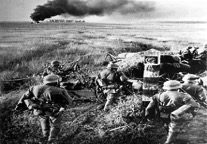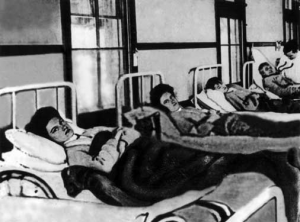Many things contributed to the fall of the Nazi Regime. People argue that Nazi ideals led to the failure of their plan for European dominance. Some say that it was the concept of “Lebensraum,” the need of living space for Germans, and others point out that the loss of World War II by Nazi Germany led to their downfall. All of these factors are true, but if we look deeper and focus in on some of the events that Nazi Germany took part in during World War II, we can pin the failed invasion of the Soviet Union, known as Operation Barbarossa, as one of the key contributing factors to the demise of Nazi Germany and everything the country stood for. This operation was an “all or nothing” operation, which meant that failure was not an option for Nazi Germany. Operation Barbarossa led to German Soldiers holding the fate of their country in their own hands as the very existence of Nazi Germany was at stake.1
In 1925 Hitler wrote the famous book Mein Kampf, which contained Hitler’s political beliefs and his plans for Germany. Hitler believed that Slavs were not part of the Aryan race, and he deemed them inferior. Mein Kampf emphasized the need for German living space, otherwise known as “Lebensraum.” To achieve this, the Germans would have to turn towards the East and focus on the Soviet Union, which would result in Hitler fighting a war on two fronts.2
The Germans began preparations as early as February 1941, anticipating that the invasion would commence during mid-May of 1941. However, due to the Balkan campaign, the date was pushed back to June 1941. The five-week delay shortened the time available to invade the Soviet Union. Hitler predicted a swift invasion, lasting only a few months, because of his rapid success in other parts of Europe. However, these successes led to Hitler being over confident, because he believed he was a political and military genius. Hitler didn’t anticipate war during the Soviet winter, and German soldiers lacked the adequate clothing and supplies to fight a war during the winter months. This would prove to be fatal to the German army as they were not prepared. On the other hand, the Soviets were also inadequately prepared. Although they had more numbers than their German counterparts, they lacked equipment or had poor quality equipment, and had worse training than the Germans. The quickly coming winter and with the Soviets lacking equipment and training, it was essential that the Germans achieved a quick victory.3

The initial offensive started June 22,1941. There were around four million German troops along with hundreds of thousands of Italian and Romanian troops. The Germans split themselves into three army groups, turning their focus to different parts of the Soviet Union. Army Group North would head to Leningrad, Army Group Center would head towards Moscow which was the Soviet capital. Army Group South would head south into Ukraine which was the center for Soviet industry and mining and had sufficient farmland for Hitler’s concept of “Lebensraum.” The Soviet south was also very rich with petroleum which was another deciding factor in the invasion. At first the invasion along the 1,800 miles took everyone in the Soviet army by surprise as the Germans were able to catch the Soviets unprepared.4
The first few weeks of the invasion were swift and fast, but by mid-July a series of rainstorms slowed the German advance deep in the Soviet Union. The rainstorms made the path treacherous for the Germans as the dirt and sandy roads turned muddy, making it difficult for German wheeled vehicles to advance. The Nazi Army made little progress with their offensive. Soviet troops would often do as much as they could to slow down the German advance, which included them burning crops, destroying bridges, and evacuating factories as they retreated. Furthermore, steel and munition plants in the West were destroyed and shipped to the East. The Soviets also destroyed most of their rail stock, depriving the Germans of use of the railroad system. Despite the Soviets doing everything in their power to slow the German attack, it still wasn’t enough, and by mid-July, the Germans had advanced more than 400 miles. The Germans were only 200 miles west of Moscow, the Soviet capital. There was still time to make significant advances before the onset of winter, but the opportunity broke down when Hitler and his generals had disagreements on where the German army would shift its focus to next. A quick victory was still essential to the German Army.5

Ultimately, after the Battle of Vyazma, which was a twenty-day battle that led to a German victory, the Germans had a clear path to Moscow. Moscow was not only the capital and largest city of the Soviet Union, but it was also one of the main military and political objectives for the Axis powers during the invasion. In early December 1941, the Germans were at the gates of Moscow with many of the troops exhausted and tired. Many of the Soviet forces were fresh, yet the Germans were so close to Moscow, it was hard to resist advancing to capture Moscow. Victory was in the Soviets’ sight, especially because of the onset of winter in the Soviet Union, which is one of the coldest countries in the world. The Germans suffered greatly during this harsh Soviet winter. The sub-zero temperatures were the most severe in decades. Frostbite decimated German troops, many of whom were already exhausted or had fallen ill due to the temperatures. Provisions were also not made for the German troops. They had very little clothing for the winter because Hitler and his generals thought the invasion would be swift. Many troops starved or froze to death. The freezing temperatures also immobilized many of the Germans’ transportation, artillery, and aircraft. In addition, many of the German supply lines were vulnerable to attacks from behind. Getting provisions to the troops up front was a difficult task for the Germans. The number of casualties the Germans faced were unheard of among the Nazis, as they barely had any losses in their previous campaigns during this war. The Soviets’ experience with the poor weather differed from the Germans. The weather was perfect for the Soviet Red Army as they were used to it and tended to fight better in freezing temperatures. 6

The turning point for Operation Barbarossa came as the drive to Moscow started to stall. The Soviets were poised for a counter offensive and were able to exploit the Germans when on December 6th, 1941, Gen. Georgy Zhukov of the Soviet Union launched a counter offensive against the Germans that the German army was never able to come back from. Many of the troops used in the counter offensive were Siberian troops who were very effective fighting in colder weather. This counter offensive drove the Germans away from Moscow and ultimately pushed them back all the way to Berlin. 7
So this leads back to the question of whether Operation Barbarossa was Hitler’s biggest failure that cost Nazi Germany World War II? The short answer would be yes, but to expand on this, we can see that Hitler and his generals made many mistakes and mishaps. Their goal to invade and overtake the Soviet Union was unrealistic from the beginning. The only reason why success seemed realistic was the fact that before Operation Barbarossa, Germany was dominating Europe and they weren’t experiencing any significant losses in these battles. The German Army was a war machine that was decimating their enemies. For this very reason Hitler and his generals grew overconfident. They were so confident they thought Operation Barbarossa wouldn’t be a long invasion and that there weren’t going to be many casualties. However, Hitler’s thinking was wrong. The Germans experienced more casualties on the Eastern front fighting the Soviets than they did on any other front. Overconfidence led Hitler to make irrational decisions for the German Army that made them not only lose the war, but also it led to a turning point in which Hitler would lose Germany as he knew it. Winter played a huge part as many of the German preparations were not geared towards fighting during the winter months. The Soviets were better suited to fight during the winter than the Germans. Without proper clothing, provisions, and other equipment needed to wage a war during the Soviet winter, Germany began to struggle towards their demise. Ultimately, Hitler was so obsessed with “Lebensraum” that he couldn’t grasp the consequences if he had failed. However, all of what Hitler had hoped for Germany would be gone by the time Germany fell to the Soviet Union.8
- Martijn Lak, “Operation Barbarossa and Germany’s Defeat in the East,” German History, Volume 29, Issue 2 (June 2011): 335–337. ↵
- H.W. Koch, “Operation Barbarossa-The Current State of the Debate,” The Historical Journal 31, no. 2 (1988): 388-390. ↵
- Britannica Encyclopedia, s.v. “Operation Barbarossa,” by John Graham Royde-Smith. ↵
- David M. Glantz, Operation Barbarossa:Hitler’s Invasion of Russia 1941(The History Press: Stroud, UK, 2011), 31-42. ↵
- Wikipedia, 2018, s.v. “Operation Barbarossa.” ↵
- Wikipedia, 2018, s.v. “Operation Barbarossa.” ↵
- Britannica Encyclopedia, s.v. “Operation Barbarossa,” by John Graham Royde-Smith. ↵
- Robert Smith Thompson & Alan Axelrod, Nazi Germany(New York;2018), 240-251. ↵



53 comments
Mia Morales
This article was very interesting. Hitler’s attempt in invading Russia failed mostly because he went in to attack the country during the winter time when temperatures in Russia can reach up to -20 degrees most of the soldiers died from frostbite and most of the Nazi’s war equipment froze and was not able to be used. Hitler had planned to invade Russia earlier but an uprising in Italy forced him to delay the invasion and put those troops towards Italy to stabilize the conflict.
Alicia Guzman
World War II was a war much larger than what is seen at the surface level. It pulled and hurt many from a large multitude of angles. Adolf Hitler initiated this chaos that rocked the world to its core. I may have not lived through this time, but my heart still feels the devastation. Operation Barbarossa put a grinding and humiliating halt that honestly really helped put a stop to the Nazi regime. I like that this article explained the political and historical aspects of this operation to provide a fuller picture.
Andres Cano
Hitler obviously overestimated the power of his own German troops. It sounds to me that he was so focused on conquering that his mind worked 10x faster than his military could keep up with. It must have been hard to please such a determined dictator and in the end it showed that Hitler bit off more than he could chew. It makes you wonder what would have happened if Nazi Germany chose not to invade Russia and saved itself from all the unnecessary suffering they faced in the invasion, but the world will never know for sure.
Ryan Estes
I liked reading this article because it explained something that I knew of but never understood the whole story. The Germans did indeed grow too confident, as they thought they could successfully invade the Soviet Union. I thought it was interesting (was it a coincidence?) that the Soviet counter offensive happened on December 6, 1941 (one day before the attacks on Pearl Harbor).
Avery Mascorro
It’s clear that a key short coming of hitler was bad communication with his generals. He would’ve had more success if everyone was on the same page. His arrogance costed him many soldiers. How could you not think of the weather? This failed invasion obviously costed them the entire war. Thankfully.
Octaviano Huron
This was a very interesting article. I was taught about Operation Barbarossa, but had never known the well-rounded story behind this attempt of military advancement. Throughout all of my high school history classes, I was taught that invading Siberia during the winter is always a bad idea. Adolf Hitler’s greed and desire to conquer was his ultimate downfall, but his “failure” arguably put an end to such a corrupt and inhumane regime.
Antonio Coffee
This was an interesting article to read. I love military history and World War II is one of the most interesting topics in it. There are a lot of reasons why Barbarossa failed but as the author said it is mainly due to Hitler’s overconfidence in the German War Machine to claim a quick victory. Hitler himself was not great at strategy when it came to considering all the factors such as the weather.
Christopher Hohman
Nice article. The Russians make a very consistent habit of starting off wars badly. It might as well be one of their trademarks. Operation Barbarossa was no exception. It must have seemed that the Nazis were on the verge of achieving a great victory, but the Soviets were able to pull their more experienced troops from Siberia and farther East, and eventually defeated the Germans. Hitler definitely made a mistake by adding a second front during the war. I wonder what would have happened if Hitler had focused solely on the United Kingdom and United States
Gabriel Dossey
There is nothing like a russian winter to keep the homeland safe. I was unaware that the name of the operation was Barbosa. A curious name to say the least. I think that it indeed safe to say that this was one of the more damning events that led to the fall of the Nazi regime. You did a good job. keep up the good work
Samantha Luckey
This is an interesting article regarding a less-known event. This author was able to establish a historical detailed background that engaged the reader about Hitler’s invasion into Russia, as well as, informing the reader of important details of a forgotten battle that had been waged. I appreciate this article’s illustration of this brutal conflict that gives a new meaning to the failure of war strategy.